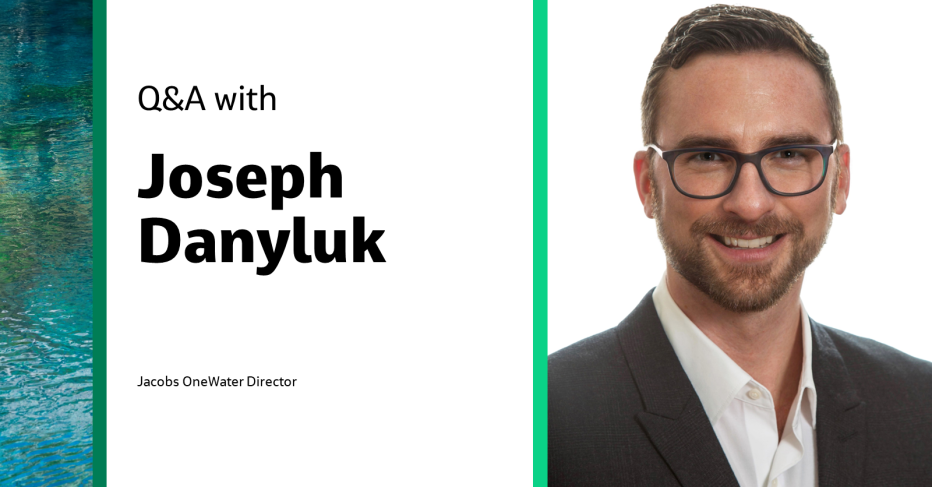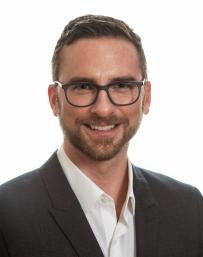Across the world, communities today face complex water challenges, from increasingly intense droughts and floods to stringent water quality mandates.
At Jacobs, we’re helping to solve our clients’ water challenges with an integrated and collaborative approach to water management: OneWater. We take a holistic view of the water cycle to break down traditional water management silos, recognize water’s connections to land, food and energy, and implement solutions that are sustainable, inclusive and equitable.

In this Q&A we connect with Jacobs OneWater Director, Joseph Danyluk, who is responsible for coordinating OneWater thinking across Jacobs’ global team of over 9,000 water professionals. Joseph discusses the benefits of OneWater management and how water connects us all — and affects us all.
Hi Joseph. Tell us about your career background and what brought you to Jacobs.
I’ve been working in the water sector now for 20 years but my focus for my undergraduate degree was actually structural engineering. That was partly because, when I was growing up, I was really inspired by iconic bridges and skyscrapers and I always had this dream that I wanted to design them. But that all changed after I completed an 8-month internship in Leipzig, Germany. While I was there I had the opportunity to contribute to a handful of different water projects, including watershed planning, so when I returned from Germany that inspired me to pursue a graduate degree in environmental and community planning.
After graduating I spent 10 years at a landscape architecture and planning company where I worked on a variety of community-focused projects, like park developments, urban design projects, community master plans and watershed plans. We’d often team up with larger engineering companies to support utilities with reducing impacts from combined sewer overflows. There were two major programs I supported in Ohio, one in Cincinnati and one in Cleveland. For both I supported planning and design of nature-based systems, including large-scale green infrastructure that was integrated within existing communities. These projects not only addressed the utilities’ compliance mandates but also restored natural systems like wetlands and streams, remediated brownfield sites, improved roadways and added or improved parks and open spaces.
That was really impactful work and it opened my eyes to how the water sector is connected to so many other areas — the environment, the economy and most importantly our communities. That was a turning point for me career-wise and I wanted an opportunity to join a global company like Jacobs and be part of those projects on a much larger scale.
You now serve as our global OneWater director. What is OneWater and why have we embraced the concept at Jacobs?
We define OneWater as an integrated and collaborative approach to understanding complex regional water challenges — not only those that we face today, but also those that we will face tomorrow. It's not a predefined set of solutions, or a standardized approach. It's really about changing the mindset of how we manage water. For so long we focused on the water cycle as an organizing theme for our sector, including the regulations and the governance structures that we use to manage water systems, which puts everything into silos (drinking water, wastewater, stormwater, etc.). But water management is a lot more complicated than that. We need a different lens to understand the challenges we face, and to identify the opportunities — that's where OneWater comes in.
Within Jacobs, we’ve spent over a year coordinating across our 9,000+ global water team to break down the silos between our individual solutions areas. We’ve also defined three principles that guide our OneWater approach:
- All water has value
- Water challenges are interconnected.
- Water solutions must be sustainable, inclusive and equitable.
So now when our teams are working with clients and communities to address water management challenges, they're guided by these principles and that opens the door to innovation and creativity.
Why is a OneWater approach important?
Firstly, there’s very significant investment in water infrastructure globally and that investment is only going to increase in future as we tackle challenges like climate change. OneWater allows our clients to be more strategic with their investments by identifying solutions that address multiple interconnected challenges. And when we start to recognize water’s connections to the built environment, health, energy, food, transportation, then we can really start to develop and implement solutions that provide more comprehensive benefits to communities.
There’s also the opportunity to bring innovation to the water sector in a more holistic way, including through technology. At Jacobs, our vision is to offer clients an integrated ecosystem of data-enabled solutions across the entire water cycle and project life cycle. We call this Digital OneWater and it allows us to better understand our water management systems today and optimize them for the future.
“For so long we focused on the water cycle as an organizing theme for our sector, including the regulations and the governance structures that we use to manage water systems, which puts everything into silos. But water management is a lot more complicated than that. We need a different lens to understand the challenges we face, and to identify the opportunities — and that's where OneWater comes in.”
How can OneWater help with the complex water challenges being brought about by climate change?
When we look at drought and water scarcity, those impacts really relate to our first OneWater principle that all water has value. That principle encourages us to take a holistic view of alternative water supply options, like water reuse and stormwater capture, to improve water security. As an example, we’re working with a client in Southern California to identify a spectrum of potential water sources to augment existing supply — and applying digital simulation tools, like Replica, to evaluate those supply options under different scenarios. With these tools, we can consider hundreds of possibilities and identify the most cost-effective and resilient solutions.
We’re also working with communities to better understand, predict and mitigate the risks from flooding. In developing flood management solutions through a OneWater lens, there’s a real opportunity to interface with projects, programs and policies that other agencies may be implementing — like transportation schemes, urban redevelopment and park improvements — so that we’re sharing investments and improving communities while reducing flood risks.
The responsibility for addressing water management challenges, including water scarcity and flooding, cannot be handled by one community or one utility alone. The solution requires coordination at a watershed or even a basin scale — and a OneWater approach facilitates that level of coordination.
How do OneWater principles serve to advance other community priorities, particularly inclusion and equity?
Given all of the different connections that water has to other sectors, it’s important that we’re not making decisions alone. OneWater brings different stakeholders to the table — utility managers and operators, ratepayers, elected officials, regulatory agencies, funding agencies, philanthropic groups, educators — so that everyone in the community understands and actively participates in the development of water management solutions.
For far too long there are population groups that have been at a disadvantage and have not had access to safe, reliable, affordable drinking water. As an industry we have a lot of work to do there, and we need to actively listen to those who have been affected for generations. At Jacobs we’re supporting clients and communities with those conversations and we’re proud to partner with groups like the US Water Alliance that are advancing equity and racial justice issues across the U.S. water sector. All of these efforts are tied to the OneWater movement.
People would be surprised to know that…
I'm second generation Ukrainian. My grandparents were all born and raised in Ukraine and they came to the U.S. after World War II. There was a small Ukrainian population in the Southside neighborhood of Pittsburgh, Pennsylvania, where my parents grew up speaking Ukrainian. We still celebrate Ukrainian traditions and holidays and enjoy Ukrainian food. That focus on our heritage was and still is an important part of who I am.
If you aren’t working, what would we be most likely to find you doing?
Spending time with my husband, David, and our families. We are both fortunate that our families are very close by, so we are together with them many evenings and weekends. We also play card games like Spades and I'll just say we're very competitive — perhaps sometimes a bit too competitive!
What's something new you learned in the last week?
I recently read a really fascinating article about digital bio acoustics. Scientists are placing digital, portable recorders around the world to collect sounds of nature that we don't hear as humans. The sounds are at ultrasonic and infrasonic frequencies, and once they’re recorded, scientists use artificial intelligence to decode and translate. They’ve discovered amazing things so far, like turtle species that communicate with their hatching eggs and plants that make sounds to attract insects. It’s mind-blowing that nature has sounds and languages that we don’t hear. It really reinforces why we need to preserve and protect our environment — there’s just so much we still don’t understand.
What would you rate 10 out of 10?
Dairy Queen’s ice cream cake — and I know that several of my colleagues at Jacobs agree with me on that!
What advice would you give to young professionals?
Within the water sector, and in water-related education or fields, we tend to put ourselves into silos. So I would encourage everyone to raise their hand and be part of projects that are outside of their comfort zone. For example, my background is wet weather management and watershed planning, and I didn't know as much about the water treatment side — but by interacting with our teams at Jacobs I’ve been able to learn so much that I didn't know before.
What do you enjoy most about being part of #OurJacobs?
The extent of experience that we collectively have at Jacobs is just incredible — not only in water, but in many other sectors. There's so much to learn — I don’t think you’d ever stop learning at a company like this. I also really respect the commitment to inclusion, thought leadership and climate response at every level of the organization.
About the interviewee

Jacobs’ OneWater Director Joseph Danyluk develops business, project delivery and thought leadership strategies focused on sustainable, equitable and resilient water management solutions. He works with communities and technical teams to develop and implement integrated solutions that not only provide near- and long-term benefits, but also demonstrate how water connects us and affects us all. For 20 years, he has supported clients with developing solutions for complex challenges affecting built and natural components of the water cycle.













































